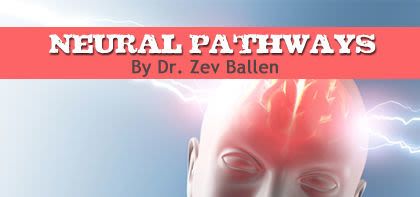
Neural Pathways
Repetition re-engineers our neural pathways, which translate into strategies for how we live. They create our patterns for depression and our patterns for happiness...

If you've ever read Likutei Halachot, a commentary on the Shulchan Aruch that was written by Rebbe Nachman's main student, Rav Natan, you'll notice that the author repeats everything many, many times. It's eight volumes for that reason! But why do we need all that repetition? Why not just say it once, and be done?
The answer is, that we need that repetition, in order to get our brains to change.
Repetition is how we re-engineer our neural pathways, and those pathways translate into strategies for how we live. They create our patterns for depression and our patterns for happiness.
Every time we want to be depressed, there's a pattern etched into our brains for how to do that. If we want to change 'getting depressed', we have to find a way to stop that pattern from firing up, early on, before it drags us in.
Neural pathways work very similarly to a regular pathway in the woods. If people don't go on a particular trail for a while, the bushes and shrubs will grow and cover that path over, and soon, you can't see that there was ever a path there. We can do the same thing with negative neural pathways, that are causing us to doubt Hashem, or to worry, because we don't know what's coming next in life.
Over time, those pathways will fade away and disappear, replaced by all the positive things we are doing right now, in the present. If we are talking a lot to G-d, and saying: 'Help me to be authentic, to be present, to breathe, help me not to listen to criticism… Show me how to do it! G-d, please be my steering wheel, and help  me to live the life you want me to live, to be connected to my wife and my kids etc etc etc' – then this is forming a new neural pathway.
me to live the life you want me to live, to be connected to my wife and my kids etc etc etc' – then this is forming a new neural pathway.
Ok, it may not be totally etched in our minds the first time we do an hour of hitbodedut, but that's why the more time we do hitbodedut, the more we reinforce these things to ourselves. We're like that first guy in the field with the high grass, who's trying to be the first person to get across and make a new trail. He sweats and he slogs to go across and 'etch' that first path. He bends all the grass and brambles out the way – but they spring back 75%. The next time he goes across, it's a bit easier and he gets a bit less scratched and tripped, and this time, the grass only springs back 50%. The third time, it's easier still, and the grass only springs back 25%, until eventually, he's started his own trail.
This is exactly what we do in personal prayer, every time we focus on a subject and try to create a new way or 'path' of thinking about it. That's another reason why it's so important to stay on the same subject for a while, as Rav Arush teaches. The more regularly we're using that new 'pathway' by talking about it in prayer, the faster it's etched in to our brains, and the faster the old, negative pathways fall into disuse.
Whatever it is, if we need more income, or good health, or a better marriage, we have to be present and focused, and to know what our feelings are. Many of us don't even know what neural pathways we're already going down, let alone what new ones we want to create! So we have to stay on it for a while, and we really have to explore what's going on around these issues, and really be 'there' with them, and not off in space, somewhere.
Remember, we're like that guy trying to get across the field. If we hike our new neural path every single day, even for just 10-15 minutes a day, and we don't get discouraged, very quickly we'll have discovered our own route to having emuna, and taking fearless action.












3/06/2013
Thank you! Thank you, Dr. Ballen. This is awsome stuff. We all know it to be true regarding "bad" habits we've developed but for some reason we've allowed the evil inclination to prevent us from seeing that the opposite is also true; we can develop good and healthy habits by repeatedly blazing new trails, one at a time, until they become well worn and easily traveled but it takes effort on our part, maybe some help from a loving family member or friend, and of course, lots of personal prayer. Thanks again for the encouragement!
3/06/2013
Thank you, Dr. Ballen. This is awsome stuff. We all know it to be true regarding "bad" habits we've developed but for some reason we've allowed the evil inclination to prevent us from seeing that the opposite is also true; we can develop good and healthy habits by repeatedly blazing new trails, one at a time, until they become well worn and easily traveled but it takes effort on our part, maybe some help from a loving family member or friend, and of course, lots of personal prayer. Thanks again for the encouragement!